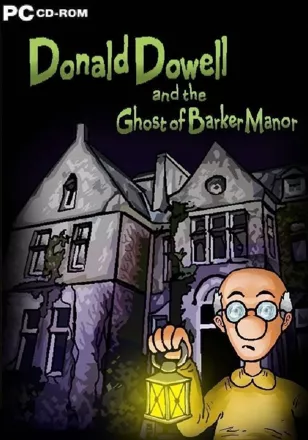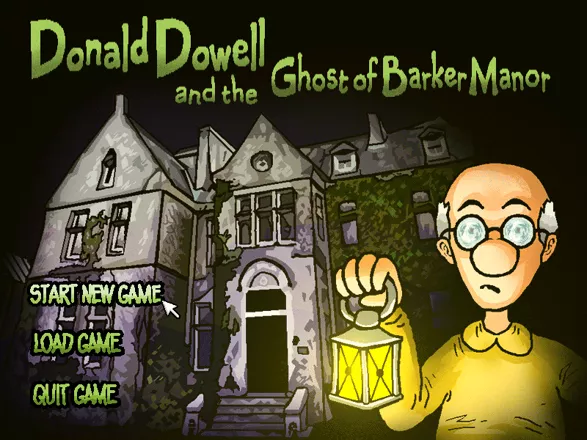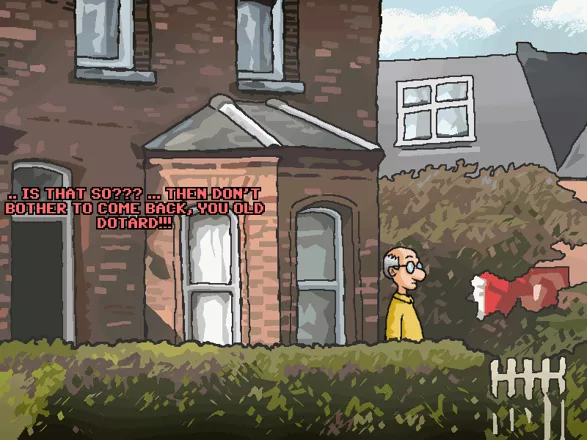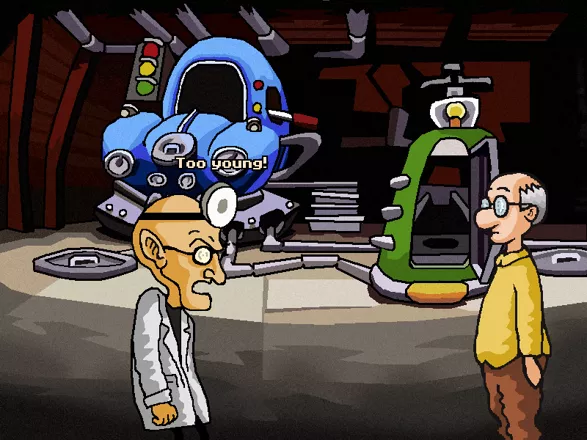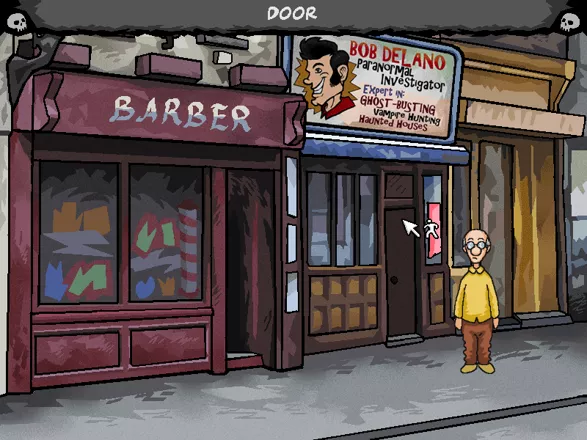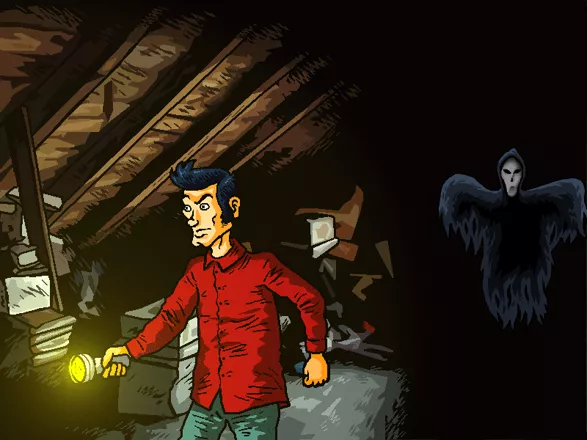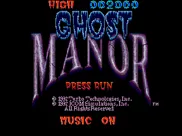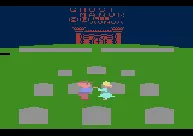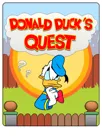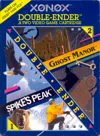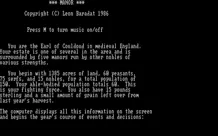Donald Dowell and the Ghost of Barker Manor
Description
Donald Dowell and the Ghost of Barker Manor is a freeware 2D point-and-click adventure game. It features an inventory. The game can be controlled via mouse. It is available in English, Italian and Bulgarian.
Donald Dowell is an Irish retired post office employee. He is now 80 years old, bored and nagged by his wife. Thus he decides to leave home and to get a job again. He finally is hired as an assistant by the secretary of the ghost buster Bob Delano. However Bob Delano is gone missing at Barker Manor where he is investigating a ghost case. Donald Dowell is sent to Barker Manor to investigate the whereabouts of Bob Delano. The game is quite humorous and has many references to video games as well as literature, art, history and other media.
Groups +
Screenshots
Reviews
Critics
Average score: 93% (based on 2 ratings)
Players
Average score: 3.5 out of 5 (based on 1 ratings)
How to make a disagreeable character pleasant
The Good
The general idea for the game isn't very original, but is still well executed. The story is cohesive, clear, and - despite obvious departures from strict realism due to supernatural elements and not particularly subtle comedy - doesn't seem "strained". It's a classic "quest"-type adventure which seems to take the traditional "top-down" approach (plan what tasks need to be performed and then add obstacles on the way to performing them). And within this classic approach one important decision is a little unconventional: the choice of protagonist. Elderly people are very rarely protagonists of games. Even though retro game players are, in fact, on average closer to 40 or so years than to the stereotypical "kid" ("because video games are non-serious art and no adult would want to play it"), it seems to be assumed that elderly people are too far from an average player's real experience and therefore uninteresting. Or, it's more generally assumed that people at this age live a boring life and are for this reason not suitable as adventure game protagonists. So I simply feel obligated to appreciate this aspect. Games - also not particularly realistic ones - should reflect the diversity of modern society. There is much talk about the marginalisation of female, or Black, or queer potential protagonists in games - maybe it's time to add the category of age to that list? And there have been many games with precocious or know-it-all children as protagonists, but a movement in the other direction - towards senior protagonists - is much more rare.
The game's graphics look fairly good. It's just incomparable to the three years later game "Tales", developed by the same company - while "Tales" has a much lower basic resolution, it represents my favourite "hand-painted" style - but looks good in its own right anyway. This game has more cartoony graphics - the more "sketchy", "dirty" kind of cartoon, somewhat comparable to for example "Spy Fox" - but many screens look very detailed or even lush anyway. This applies particularly to some indoor sceneries, such as Bob Delano's office or several rooms inside the hotel.
Some jokes in the game are rather questionable, but some are really funny (if still not very sophisticated). The game specialises in "breaking the fourth wall" - at some points Donald realises that he is a video game protagonist, controlled by a player, and says some comments aimed at the player - such as about things being too easy for the player, who is sitting comfortably in front of the computer, or several "hammerspace" jokes. "Hammerspace" is a well-known game motif - even if game protagonists often don't carry even a bag or backpack (and really, this would be just realistic - most of us real people take such things when going outside...), they can somehow fit even ridiculously large items in their pockets. Funny comments about it are a long-known motif as well and Donald, too, repeatedly says things like "What do you think I have done with it? I put it in my pocket!".
The game also includes a lot of references to classic games and other texts of culture. Some are fairly serious - for example, a subquest very strongly inspired by Ernest Hemingway's story "Old Man and the Sea". Others are - as typical with such references in video games - very funny. At some point the protagonist enters a little local church, but if he tries to read the Bible at the altar... we will discover that instead of what is actually written there, some Biblical stories are told... as fragments of walkthroughs to fictional games (for example, the story of Jews fleeing Egypt is the plot of a supposed game under the title "The Promised Land").. Some might find this idea objectionable, I still liked it. I think that we should distinguish between mocking religion (which is always wrong because other people's beliefs deserve respect also if someone happens to not share them) and joking about religion (which is culturally productive and has also been done by some deeply religious people).
The Bad
Despite the unconventional and even, I would say, brave decision to make an elderly man the protagonist, he isn't portrayed as a particularly nice person. It still doesn't mean that the game simply mocks elderly people - it is, after all, "dedicated to our grandparents", so I would say it's rather a kind of ironic bantering, with trust in these grandparents' sense of humour and ability to make fun of themselves. But nevertheless Donald doesn't make a very good impression. He is vain - having just started working for Bob Delano, without any opportunity to actually work WITH him, he already calls himself "the greatest ghostbuster in Europe". And he's shown as not the most intelligent person around - when he automatically assumes that someone met in a church must be the priest, when he doesn't understand the title of "professor doctor" and thinks that it means being a professor and a doctor at the same time, when he doesn't realise until the very end of the game that the ghost detector is actually working, or when he makes comments against reading and in favour of TV and mass culture. Although, this is so blatant that it's rather a parody meant to be immediately recognised as sarcastic.
Some plot choices are just... dubious, just too brutal. One at least ends well, as seen in the credits, but the two I disliked most were: Donald's treatment of miss Marble and breaking a marriage.
And I just can't accept the misogynic undertone of the game. After all, the source of the adventure is Donald's boredom, his desire to work again, which is exacerbated by his own unhappy marriage. And his wife is shown as a stereotypical nagging shrew, so that the player has no doubt that Donald is the victim here. Then, there is miss Marble - a middle-aged, unattractive, perverted, desperate husband hunter. (A positive exception is at least miss Purple, who seems like a forgetful little old lady, but turns out to be a retired famous astronomer and an empathetic person too.) I have seen such cultural images, particularly men who, after all, have decided to get married without any coercion, but make it seem like their fiancee is dragging them forcibly to the altar or marriage office. As a feminist cartoonist commented: if they are so unhappy about getting married, then don't these men realise that really, they DON'T HAVE TO get married? The cultural image of a fiance being forced to marry and sacrificing all his freedom results in another cultural image, of the browbeaten husband, preferably also hit with a rolling pin by his wife. ;)
Obviously, the game is a comedy adventure, with a lot of irony, sarcasm and just making fun of some stereotypes. But it's too easy to perpetuate them - sometimes even without wanting to, sometimes... also without obvious bad intentions, just because it seems easier and people don't recognise the consequences. And the consequence is perpetuating misogyny.
The Bottom Line
"Donald Dowell and the Ghost of Barker Manor" is a funny game, with the comedy aspect definitely in front of the others (such as the detectivistic, supernatural or "nostalgic" aspect). The puzzles are, generally, well designed, cohesive and logical and the jokes will often leave players smiling or even laughing. But despite this, some of these jokes are just dubious, insensitive or coarse. Remember this when playing the game, and particularly - rest assured that real women aren't like Donald's wife.
Windows · by Nowhere Girl (8782) · 2020
Analytics
Identifiers +
Contribute
Are you familiar with this game? Help document and preserve this entry in video game history! If your contribution is approved, you will earn points and be credited as a contributor.
Contributors to this Entry
Game added by Sunset Sundowner.
Game added October 15, 2016. Last modified February 22, 2023.


